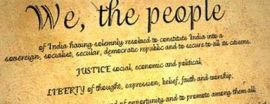CONSTITUTIONAL LAW OF INDIA
THE PREAMBLE-
The Preamble is considered to be the introduction of the Constitution of India.It describes and sets the goals and ideals which the makers of the Constitution intend to achieve through the Constitution. As the Preamble is an integral part of the Constitution of India , it is very important to understand and study the Preamble in detail to further understand the Constitutional Law.
The Preamble Says-
WE, the people of India, having solemnly resolved to constitute India into a Sovereign, Socialist, Democratic, Republic and to secure to its citizens:
Justice, social, economic and political;
Liberty of thought, expression, belief, faith and worship;
Equality of status and of opportunity;
And to promote among them all;
Fraternity, assuring the dignity of the individual, and the unity and the integrity of the Nation;
In our Constituent Assembly, this twenty-sixth day of November, 1949, do herby, Adopt, Enact and Give to ourselves this Constitution.
Explanation-
The very start of the Preamble is with ‘WE the people of India’.Why?
Because, the words ‘WE the people of India’ indicates the source from which the Constitution of India comes into existence which are the people of India.The ultimate Political power and sovereignty lies in the hands of the people. The sanction behind the Constitution is the will of the people.
- Sovereign-
Sovereignty states the independent authority of the State. It means that the State has the full right and power to legislate on any matter or subject and is not subjected to any kind of control of any other State or external power.
- Secular-
The term Secular denotes that the State does not favour or recognize any religion as a State religion, infact it treats all religion equally.
- Democratic-
The term Democratic means that the government is by the people.Governments gets its authority from the will of the people.
- Republic-
Republic means that form of government in which the head of the state is an elected person rather than a hereditary monarch like King or Queen in Great Britain.
- Justice-
Justice social, political and economic-
Social justice-which means abolition of all kinds of inequalities whether of wealth, opportunity, sex , race, religion , residence, decent.
Political justice-means there shall be no distinction between man and women in political matters. Every citizen of India who attains the age of 18 years is entitled to vote.
Economic justice-means establishing economic democracy .i.e. equal pay for equal work. Equality in all aspects.
- Equality-
It means all people are going to be treated equally without any kind of discrimination’s between them of caste, sex, birth, religion, race. Right to Equality is also a Fundamental right.
- Fraternity-
Fraternity means a feeling, a spirit of common brotherhood. Equality amongst all the sections of society. A feeling that all the people of the country are children of the same soil, no one is different from the other.





